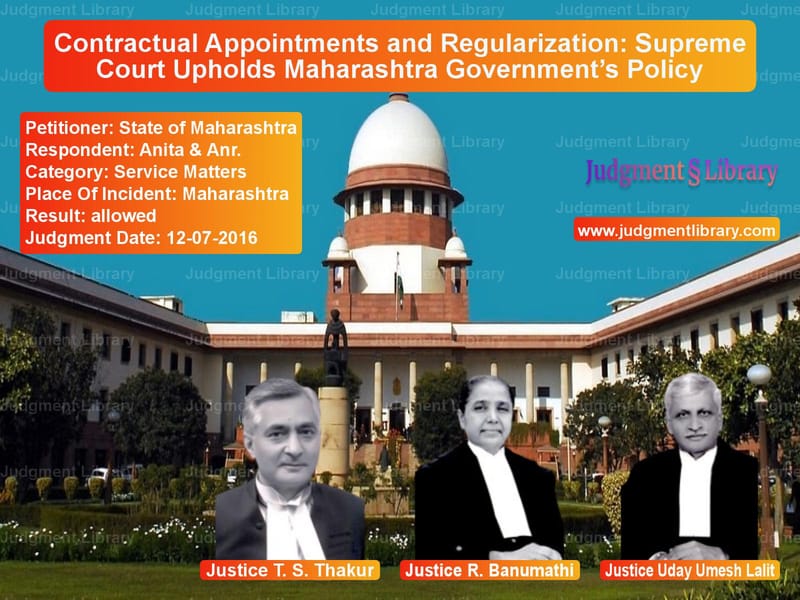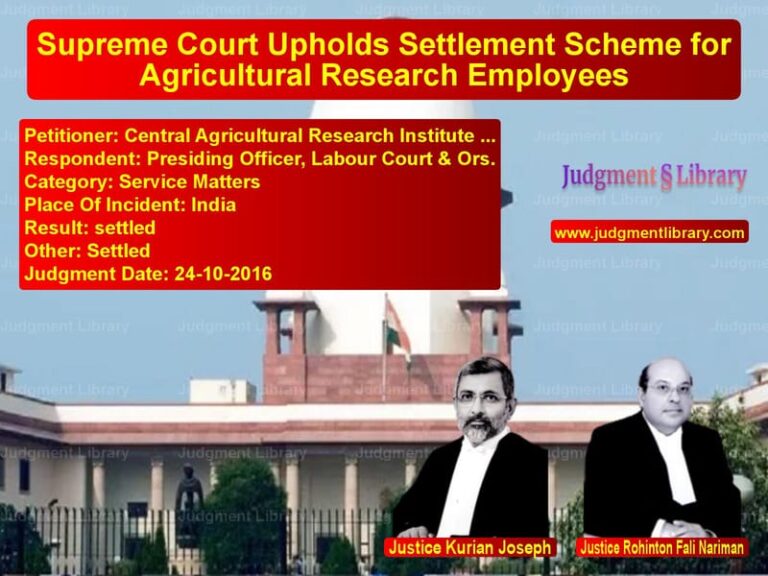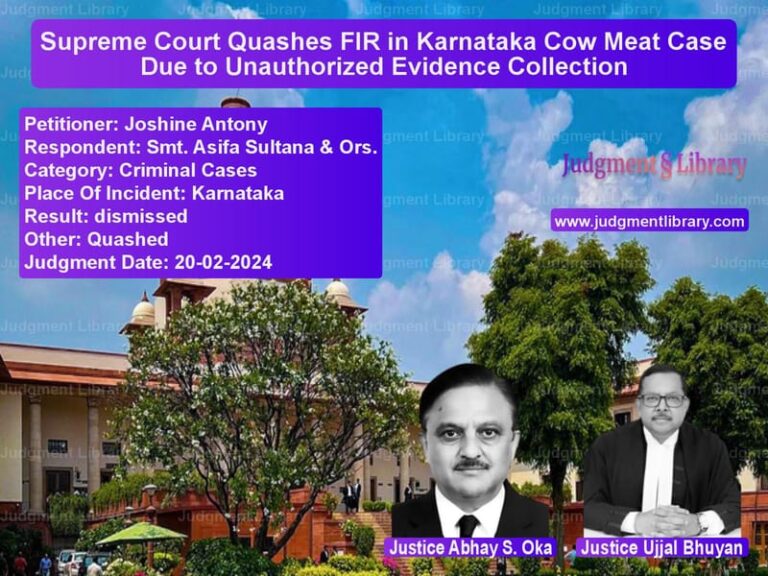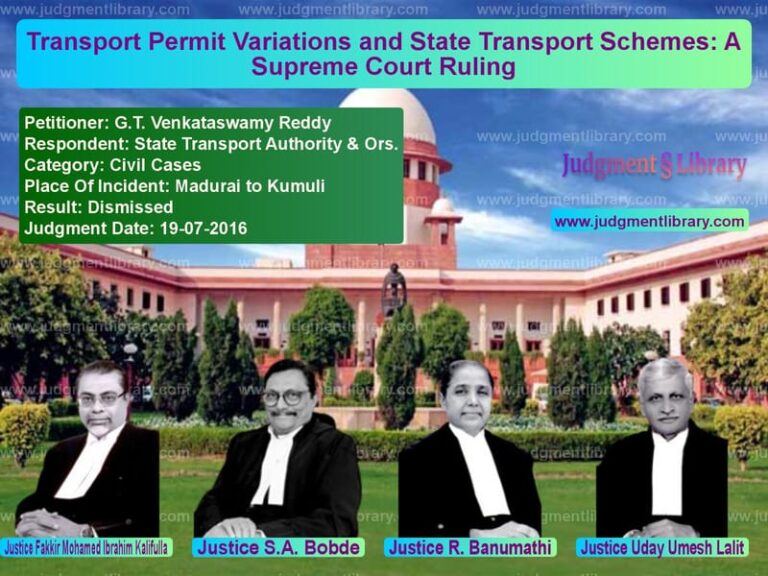Contractual Appointments and Regularization: Supreme Court Upholds Maharashtra Government’s Policy
The case of State of Maharashtra & Ors. vs. Anita & Anr. etc. revolves around the nature of contractual employment in government services and whether such appointments can be converted into permanent positions. The key legal issue before the Supreme Court was whether the Maharashtra Government’s policy of hiring Legal Advisors, Law Officers, and Law Instructors on a contractual basis could be challenged as unconstitutional. The Court upheld the policy, ruling in favor of the State.
Background of the Case
In 2006, the Government of Maharashtra created 471 posts for Legal Advisors, Law Officers, and Law Instructors under the Director General of Police and the Commissioner of Police, Greater Mumbai. These positions were sanctioned through Government Resolutions dated August 21, 2006, and September 15, 2006, with the explicit condition that they would be filled on a contractual basis. The appointments were initially for 11 months, with a provision for extension up to three terms.
After the completion of their contractual tenure, several appointees sought permanent status in government service, challenging the contractual nature of their appointments before the Maharashtra Administrative Tribunal. The Tribunal ruled that certain provisions in the Government Resolutions were arbitrary. The State challenged this decision before the Bombay High Court, which held that the posts were permanent in nature but refused to grant regularization to the appointees. Aggrieved, both the State and the affected employees appealed to the Supreme Court.
Key Legal Issues Considered
- Were the 471 posts created by the Government permanent in nature?
- Could employees appointed on a contractual basis claim regularization?
- Was the State Government’s policy to engage employees on a contractual basis arbitrary or unconstitutional?
Arguments from Both Sides
Appellant’s (State of Maharashtra) Arguments
The State Government contended:
- “The decision to engage employees on a contractual basis is a policy matter and cannot be challenged as unconstitutional.”
- “The appointments were made for administrative efficiency and cost-effectiveness.”
- “The respondents were aware of the terms of their employment and are estopped from challenging them.”
Respondent’s (Employees) Arguments
The employees argued:
- “The posts were permanent in nature, and the appointments should also have been made permanent.”
- “The repeated extensions of contracts indicate that the government needed full-time staff.”
- “Denying them regularization violates Articles 14 and 16 of the Constitution, which ensure equality in public employment.”
Supreme Court’s Judgment
The Supreme Court ruled in favor of the State, stating:
- “The decision to hire employees on a contractual basis falls within the domain of government policy and does not warrant judicial interference.”
- “The respondents were fully aware of the contractual nature of their appointments and cannot later claim regularization.”
- “The posts may be permanent, but the government has the discretion to determine how they are filled.”
Analysis of the Judgment
The Supreme Court relied on the principles established in previous cases concerning public employment, emphasizing:
- Governments have the discretion to decide whether posts should be filled on a permanent or contractual basis.
- Acceptance of a contractual appointment implies agreement to its terms, precluding later claims for regularization.
- Judicial review of policy decisions should be limited to cases of clear arbitrariness or discrimination.
The Court observed:
“The nature of employment cannot be altered by courts merely because the appointees seek permanency. Policy decisions regarding employment must be left to the government.”
Implications of the Judgment
This ruling has significant implications:
- It upholds the government’s authority to determine hiring policies.
- It prevents contractual employees from claiming permanent status unless expressly provided for.
- It reinforces that public employment must follow due process and cannot be granted by judicial intervention.
- It provides clarity on the distinction between permanent posts and permanent appointments.
Conclusion
The Supreme Court’s decision reinforces the principle that contractual employment in government service is a policy matter that courts should not interfere with. This ruling will impact future cases concerning the regularization of contractual employees, ensuring that hiring policies remain within the government’s prerogative. The judgment affirms that while public employment must adhere to constitutional principles, judicial intervention should be limited to cases of clear illegality or discrimination.
Don’t miss out on the full details! Download the complete judgment in PDF format below and gain valuable insights instantly!
Download Judgment: State of Maharashtra vs Anita & Anr. Supreme Court of India Judgment Dated 12-07-2016-1741873229075.pdf
Direct Downlaod Judgment: Direct downlaod this Judgment
See all petitions in Employment Disputes
See all petitions in Termination Cases
See all petitions in Recruitment Policies
See all petitions in Judgment by T.S. Thakur
See all petitions in Judgment by R. Banumathi
See all petitions in Judgment by Uday Umesh Lalit
See all petitions in allowed
See all petitions in supreme court of India judgments July 2016
See all petitions in 2016 judgments
See all posts in Service Matters Category
See all allowed petitions in Service Matters Category
See all Dismissed petitions in Service Matters Category
See all partially allowed petitions in Service Matters Category







